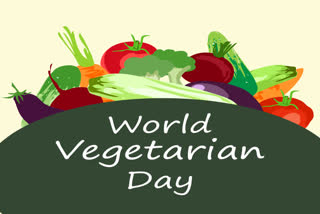Choosing vegetarianism is gradually becoming a trend in order to avoid cruelty faced by animals to be served on plates. Therefore, every year on 1st October, World Vegetarian Day is celebrated in order to promote vegetarianism and spread awareness about how it benefits health and the environment. The most common source of vegetarian foods is plants based diet. This day was first observed by the North American Vegetarian Society (NAVS) in 1977.
Types of Vegetarians
Vegetarians can be categorized into 3 broad categories, as stated by the National Health Portal (NHP) of India:
- Vegan: This diet includes only plant-based food. It does not include any animal protein or animal by-products such as eggs, milk, or honey. It generally includes raw fruits, vegetables, legumes, sprouts, and nuts.
- Lacto-vegetarian: includes plant food and dairy products but not eggs.
- Lacto-Ovo vegetarian: includes plant food, dairy products, and eggs.
Having A Balanced Diet
Whichever type of a vegetarian you choose to be, you must ensure that you consume a healthy balanced diet to get sufficient nutrients for the proper functioning and growth of the body. NHP suggests the following foods and the vitamins or minerals that can be found in them:
- Vitamin B12:
Dairy products, eggs. Fortified cereals, bread, soy, and rice drinks - Vitamin D:
Milk and sunlight - Calcium:
Dairy products, dark green leafy vegetables, broccoli - Protein:
Pulses, dairy products (milk and cheese), eggs, tofu, and other soy products, dried beans, and nuts - Iron:
Eggs, dried beans, dried fruits, whole grains, leafy green vegetables - Zinc:
Wheat germ, nuts, fortified cereal, dried beans, and pumpkin seeds
